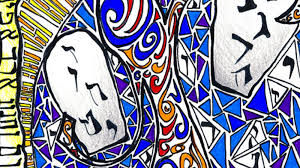This week's 10-Minute Torah (14 October 2023): Parashat Bereishit 5784
- Rabbi Stephen Epstein

- Oct 5, 2023
- 3 min read

Parashat Bereshit 5784 / פָּרָשַׁת בְּרֵאשִׁית
14 October 2023 / 29 Tishrei 5784
Parashat Bereshit is the 1st weekly Torah portion in the annual Jewish cycle of Torah reading.
Torah Portion: Genesis 1:1-6:8
Bereishit (“In the Beginning”), the first parashah in the annual Torah reading cycle, begins with God’s creation of the world. The first people, Adam and Eve, eat from the Tree of Knowledge and are banished from the Garden of Eden. Their elder son, Cain, kills their younger son, Abel, and Cain is destined to a life of wandering. [1]
Triennial year 2
1: 2:4-9 · 6 p’sukim ·
2: 2:10-19 · 10 p’sukim ·
3: 2:20-25 · 6 p’sukim ·
4: 3:1-21 · 21 p’sukim ·
5: 3:22-24 · 3 p’sukim ·
6: 4:1-18 · 18 p’sukim ·
7: 4:19-26 · 8 p’sukim ·
maf: 4:23-26 · 4 p’sukim ·
Haftarah for Ashkenazim*: I Samuel 20:18-42 · 25 p’sukim *Shabbat Machar Chodesh
Commentary and Divrei Torah
Hertz Chumash: pp. 6 – 16 Triennial Year 2 (Full Kriyah pp. 2 – 20)
Artscroll Chumash: pp. 2 – 23 Triennial Year 2 (Full Kriyah pp. 10 – 29)
Etz Chaim Chumash: pp. 12 – 29 Triennial Year 2 (Full Kriyah pp. 3 – 34)
We now are now in Triennial year 2 and are thus reading the middle part of each Parashat. Our cycle for 5784 contains the story of Cain and Abel, the first human offspring and brothers of Creation. The story of how each made an offering to Hashem and only Abel’s offering was accepted.
Let’s dive deeper into the interaction between Hashem and Cain after the rejection. It becomes apparent that Hashem comforts Cain in chapter 4, verse 7 when Hashem says, “If thou doeth well, shall it not be lifted up? And I thou doest not well, sin coucheth at the door; and unto thee is its desire, but thou mayest rule over it.” (Hertz Chumash p. 14, Soncino Publishing).
Consider that Hashem is playing counselor to Cain by reassuring him that there’s always next time and he can improve. But G-d is also warning Cain that if he doesn’t look into himself and work on his faults but rather give in to them, he is inviting sin. And unfortunately, that’s exactly what happened.
A very fitting beginning to our Torah as we conclude our High Holidays.
Parashat Bereshit 5784 / פָּרָשַׁת בְּרֵאשִׁית
14 de octubre de 2023 / 29 de Tishrei 5784
Parashat Bereshit es la primera porción semanal de la Torá en el ciclo judío anual de lectura de la Torá.
Porción de la Torá: Génesis 1:1-6:8
Bereshit (“En el principio”), la primera parashá del ciclo anual de lectura de la Torá, comienza con la creación del mundo por parte de Dios. Los primeros pueblos, Adán y Eva, comen del Árbol del Conocimiento y son desterrados del Jardín del Edén. Su hijo mayor, Caín, mata a su hijo menor, Abel, y Caín está destinado a una vida errante. [1]
Trienal año 2
1: 2:4-9 · 6 pesukim ·
2: 2:10-19 · 10 pesukim ·
3: 2:20-25 · 6 pesukim ·
4: 3:1-21 · 21 pesukim ·
5: 3:22-24 · 3 pesukim ·
6: 4:1-18 · 18 pesukim ·
7: 4:19-26 · 8 pesukim ·
maf: 4:23-26 · 4 pesukim ·
Haftará para los Ashkenazim*: I Samuel 20:18-42 · 25 p’sukim *Shabbat Machar Jodesh
Comentario y Divrei Torá
Sefaria OU Torah Seminario Teológico Judío Universidad Judía Americana
Hertz Chumash: págs. 6 – 16 Trienal Año 2 (Kriyah completa págs. 2 – 20)
Artscroll Chumash: págs. 2 – 23 Trienal Año 2 (Kriyah completa págs. 10 – 29)
Etz Jaim Jumash: págs. 12 – 29 Año Trienal 2 (Kriyah completa págs. 3 – 34)
Ahora estamos en el segundo año trienal y, por lo tanto, estamos leyendo la parte media de cada Parashat. Nuestro ciclo para 5784 contiene la historia de Caín y Abel, los primeros descendientes humanos y hermanos de la Creación. La historia de cómo cada uno hizo una ofrenda a Hashem y solo se aceptó la ofrenda de Abel.
Profundicemos en la interacción entre Hashem y Caín después del rechazo. Se hace evidente que Hashem consuela a Caín en el capítulo 4, versículo 7 cuando Hashem dice: “Si haces el bien, ¿no será enaltecido? Y si no haces bien, el pecado está a la puerta; y a ti es su deseo, pero tú puedes gobernarlo”. (Hertz Chumash pág. 14, Soncino Publishing).
Considere que Hashem está actuando como consejero de Caín, asegurándole que siempre habrá una próxima vez y que puede mejorar. Pero Dios también le está advirtiendo a Caín que si no mira dentro de sí mismo y trabaja en sus faltas, sino que cede ante ellas, está invitando al pecado. Y, lamentablemente, eso es exactamente lo que pasó.
Un comienzo muy apropiado para nuestra Torá al concluir nuestras Altas Fiestas.





Comments